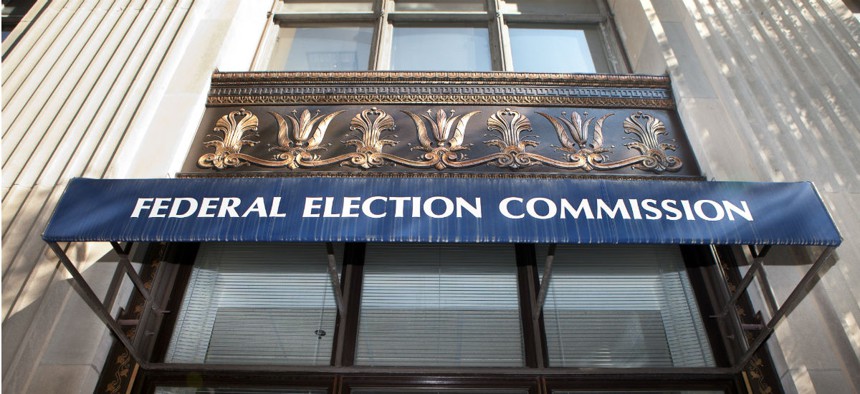
Mark Van Scyoc/Shutterstock
Legal Group Seeks Probe of FEC Commissioner for Trump Tweet
Weintraub challenged president for proof of New Hampshire voter bussing.
In the latest dust-up at the divided Federal Election Commission, a tweet from a commissioner challenging a statement from President Trump has prompted a conservative legal group to demand an inspector general investigation of whether federal ethics laws were violated.
The Cause of Action Institute on Tuesday wrote to FEC Inspector Lynne McFarland and the agency ethics officer suggesting that Commissioner Ellen Weintraub violated federal ethics laws on Feb. 10 when she demanded that Trump provide evidence for his Feb. 9 claim, repeated by a White House staffer later on television, that there was election fraud in New Hampshire, allegedly in the form of outside voters being bussed into the state.
“Commissioner Weintraub used government property and official time to make these statements, and then promoted her statement on the FEC website, social media, and national media outlets,” the group’s Assistant Vice President Lee Steven said, alleging violations of FEC and Office of Government Ethics regulations.
“The public must have confidence that federal agency employees are acting within their ethical requirements and that taxpayer dollars are being used for authorized purpose,” he said.
Cause of Action questions whether Weintraub’s challenge should remain on the FEC website, saying such issues are outside the mission of the agency, which deals with campaign spending, not fraud.
Weintraub issued a statement and appeared on TV and radio calling on Trump to “immediately share his evidence with the public and with the appropriate law-enforcement authorities so that his allegations may be investigated promptly and thoroughly,” noting that if true, such a scheme would “constitute thousands of felony criminal offenses under New Hampshire law.”
Cause of Action also pointed out that Weintraub took a different view in another case last fall, when she tweeted that voter fraud was beyond FEC jurisdiction.”
As reported by TalkingPointsMemo, Weintraub on Tuesday tweeted, “I will not be silenced.”
Asked for comment, Jordan Libowitz, communications director for the nonprofit Citizens for Responsibility and Ethics in Washington, told Government Executive, “Paying for buses to take voters to the polls to vote for Hillary Clinton would be an in-kind contribution to the Clinton campaign, so asking for evidence of a possible [1974] Federal Elections Campaign Act violation would seem to be well within the regular duties of a FEC commissioner.”
Brendan Fischer, associate counsel for the Campaign Legal Center, said the demand for an IG probe “strikes me as a stretch since the underlying regulations are aimed at prohibiting the use of official resources for some sort of private benefit, financial or other.” The examples in the rule include an “official having a secretary type personal correspondence that has nothing to do with official business,” he noted.
“More importantly, allegations of voter fraud potentially can fall under the FEC,” Fischer added. “Trump said people were being bussed in. Paying for buses then could well be an expenditure and likely should be reported to the FEC as an in-kind contribution.” If fraud was happening “on as massive a scale as Trump alleged, somebody is likely paying for it,” he added.
Ordinarily, the FEC does not investigate voter fraud, which is the province primarily of the states and the federal Justice Department, he said. “But funding voting-related endeavors may fall under the FEC’s jurisdiction.
Image via Mark Van Scyoc/Shutterstock.







